Eat to Beat Stress: Foods That Reduce Anxiety
Here’s some good news to keep in mind the next time you’re stressed out: Eating may be a stay-calm trick. We’re not talking about stuffing yourself with your typical go-to comfort food, such as mac and cheese or French fries, because that will only leave you feeling guilty and even more anxious. Instead, feed your face with one (or more) of these 10 superfoods to feel at ease fast.
Pumpkin seeds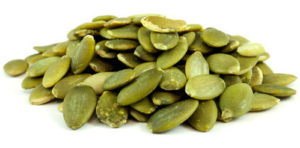
Pumpkin seeds are an excellent source of potassium, which helps regulate electrolyte balance and manage blood pressure.
Eating potassium-rich foods such, as pumpkin seeds or bananas, may help reduce symptoms ofstress and anxiety.
Pumpkin seeds are also a good source of the mineral zinc. One study carried out on 100 female high school students found that zinc deficiency may negatively affect mood.
Zinc is essential for brain and nerve development. The largest storage sites of zinc in the body are in the brain regions involved with emotions.
Asparagus 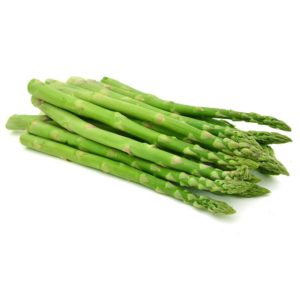
Depression has been linked to low levels of folic acid, and one vegetable that boosts this mood-enhancing nutrient is asparagus. A single cup provides two-thirds of your daily value, and it’s easy to fit asparagus into almost any meal. Some ideas: Sauté some asparagus tips for a tasty omelet. Go with steamed or grilled spears as a side vegetable for meat, fish or poultry. Snack on some steamed spears by dipping in some dressing.
Avocado 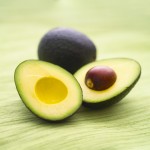
We need B vitamins for healthy nerves and brain cells, and feelings of anxiety may be rooted in a B vitamin deficiency. Avocados are rich in stress-relieving B vitamins. Bonus: They’re also high in monounsaturated fat and potassium, which help lower blood pressure. Next time stress has you reaching for a pint of full-fat ice cream, opt for a non-dairy DIY version made with avocado blended with a ripe banana, vanilla extract, nut milk, and nonnutritive sweetener. Freeze, then chill-out.
Dark chocolate
Experts have long suspected that dark chocolate might help reduce stress and anxiety. A 2014 study found that 40g of dark chocolate helped reduce perceived stress in female students.
Other studies have generally found that dark chocolate or cocoa may improve mood. However, many of these studies are observational, so the results need to be interpreted with caution.
Although it is still unclear how dark chocolate reduces stress, it is a rich source of polyphenols, especially flavonoids. One study suggested thatflavonoids might reduce neuroinflammation and cell death in the brain as well as improve blood flow.
Chocolate has a high tryptophan content, which the body uses to turn into mood-enhancingneurotransmitters, such as serotonin in the brain.
Dark chocolate is also a good source of magnesium. Eating a diet with enough magnesium in it ortaking supplements may reduce symptoms of depression.
When choosing dark chocolate, aim for 70 percent or more. Dark chocolate still contains added sugars and fats, so a small serving of 1 to 3 grams (g) is appropriate.
Turmeric
Turmeric is a spice commonly used in Indian and South-East Asian cooking. The active ingredient in turmeric is called curcumin. Curcumin may help lower anxiety by reducing inflammation and oxidative stress that often increase in people experiencing mood disorders, such as anxiety and depression. A 2015 study found that curcumin reduced anxiety in obese adults.
Another study found that an increase of curcumin in the diet also increased DHA and reduced anxiety. Turmeric is easy to add to meals. It has minimal flavor, so goes well in smoothies, curries, and casserole dishes.
Blueberries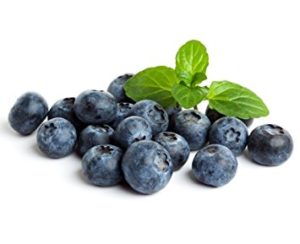
Blueberries may seem small, but just a handful pack a powerful punch of antioxidants and vitamin C, making them mighty stress-busters. When we’re stressed, our bodies need vitamin C and antioxidants to help repair and protect cells. While blueberries are tasty all by themselves (tip: freeze them for a cold berry snack), there’s no better way to boost the nutrition in a serving of yogurt or high-fiber cereal.
Green tea
Green tea contains an amino acid called theanine, which is receiving increasing scrutiny due to its potential effects on mood disorders. Theanine has anti-anxiety and calming effects and may increase the production of serotonin and dopamine.
A 2017 review found that 200 mg of theanine improved self-reported relaxation and calmness while reducing tension in human trials.
Green tea is easy to add to the day-to-day diet. It is a suitable replacement for soft drinks, coffee, and alcoholic beverages.
Almonds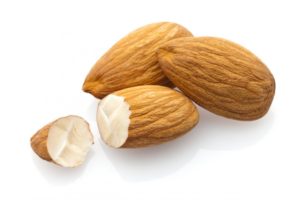
Get some stress-relief munching on almonds, which are rich in vitamins B2 and E. Both of these nutrients help bolster the immune system during times of stress. Just a quarter cup of almonds each day does the trick. For variety, spread some almond butter on fruit slices or whole wheat crackers.
Oranges
There’s a reason orange juice is said to be part of the breakfast of champions: Vitamin C is another vitamin known to lower blood pressure and the stress hormone cortisol. For a quick burst of vitamin C, simply eat a whole orange or drink a glass of freshly squeezed orange juice without added sugar.
Salmon
Put more fish on your dish to help you feel at ease. A diet rich in omega-3 fatty acids helps keep cortisol and adrenaline from spiking when you’re feeling tense. Salmon is one of the very best sources of omega-3s: Consuming 4 ounces at least three times a week goes a long way towards protecting your heart when those stress hormones are surging.
Spinach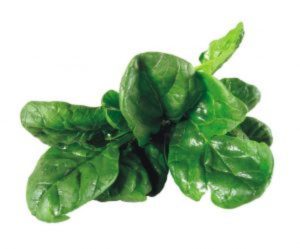
Make like Popeye and fill up on spinach. Leafy greens may not be your idea of comfort food, but spinach can have a comforting effect. Spinach is packed with magnesium, the mineral that helps regulate cortisol levels and promote feelings of wellbeing. A mere cup of spinach fills 40 percent of your daily quota, so slip some in with your morning eggs, swap for lettuce in your sandwich, have a salad, steam it as a side dish,or drop a handful of leaves into your soup.
Turkey
That sleepy feeling you get after eating Thanksgiving dinner is due to the amino acid tryptophan found in turkey. Tryptophan signals the brain to release the feel-good chemical serotonin, which promotes calmness and even tiredness.
Oatmeal
Oatmeal is another food that helps get the calm-inducing hormone serotonin flowing. Go with thick-cut, old fashioned oats that require cooking instead of instant oatmeal. Why? Coarse oats are higher in fiber and so they take longer to digest (meaning their calming effect actually lasts longer).
The next time you feel overwhelmed, eat your way calm by putting these superfoods on your plate.
Other foods that may help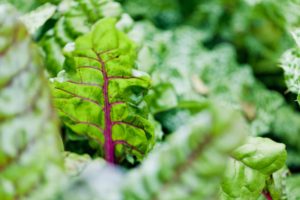
Eat a varied and balanced diet with high quality, nutrient-dense carbohydrates, fats, and proteins.
Aim for whole foods, vegetables, fruit, legumes, whole grains, lean meats, and especially fish. Other foods that may help include:
-
Turkey and other tryptophan-containing foods such as eggs, dark chocolate, cheese, pineapple, bananas, oats, and tofu.
-
Nuts, especially almonds are an excellent source of vitamin E. Vitamin E deficiency has been linked to mood disorders.
- Chia seeds are also a good source of omega-3s.
- Protein sources, such as lean meat, fish, nuts, and dairy all provide amino acids, which the body converts into the mood-lifting neurotransmitters, such as serotonin.
- Spinach and Swiss chard are both high in magnesium.
- Cinnamon provides anti-inflammatory properties
Evidence increasingly shows that diets high in processed foods can increase anxiety.








